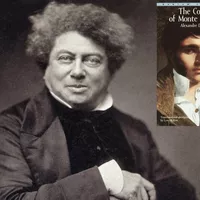Chapter 14. The Two Prisoners (3)
"It is here; unlock the door, Antoine." The turnkey obeyed, and the inspector gazed curiously into the chamber of the "mad abbe." In the centre of the cell, in a circle traced with a fragment of plaster detached from the wall, sat a man whose tattered garments scarcely covered him. He was drawing in this circle geometrical lines, and seemed as much absorbed in his problem as Archimedes was when the soldier of Marcellus slew him.
He did not move at the sound of the door, and continued his calculations until the flash of the torches lighted up with an unwonted glare the sombre walls of his cell; then, raising his head, he perceived with astonishment the number of persons present. He hastily seized the coverlet of his bed, and wrapped it round him.
"What is it you want?" said the inspector.
"I, monsieur," replied the abbe with an air of surprise--"I want nothing." "You do not understand," continued the inspector; "I am sent here by government to visit the prison, and hear the requests of the prisoners." "Oh, that is different," cried the abbe; "and we shall understand each other, I hope." "There, now," whispered the governor, "it is just as I told you." "Monsieur," continued the prisoner, "I am the Abbe Faria, born at Rome. I was for twenty years Cardinal Spada's secretary; I was arrested, why, I know not, toward the beginning of the year 1811; since then I have demanded my liberty from the Italian and French government." "Why from the French government?" "Because I was arrested at Piombino, and I presume that, like Milan and Florence, Piombino has become the capital of some French department." "Ah," said the inspector, "you have not the latest news from Italy?" "My information dates from the day on which I was arrested," returned the Abbe Faria; "and as the emperor had created the kingdom of Rome for his infant son, I presume that he has realized the dream of Machiavelli and Caesar Borgia, which was to make Italy a united kingdom." "Monsieur," returned the inspector, "providence has changed this gigantic plan you advocate so warmly." "It is the only means of rendering Italy strong, happy, and independent." "Very possibly; only I am not come to discuss politics, but to inquire if you have anything to ask or to complain of." "The food is the same as in other prisons,--that is, very bad; the lodging is very unhealthful, but, on the whole, passable for a dungeon; but it is not that which I wish to speak of, but a secret I have to reveal of the greatest importance." "We are coming to the point," whispered the governor. "It is for that reason I am delighted to see you," continued the abbe, "although you have disturbed me in a most important calculation, which, if it succeeded, would possibly change Newton's system. Could you allow me a few words in private." "What did I tell you?" said the governor.
"You knew him," returned the inspector with a smile. "What you ask is impossible, monsieur," continued he, addressing Faria. "But," said the abbe, "I would speak to you of a large sum, amounting to five millions." "The very sum you named," whispered the inspector in his turn. "However," continued Faria, seeing that the inspector was about to depart, "it is not absolutely necessary for us to be alone; the governor can be present." "Unfortunately," said the governor, "I know beforehand what you are about to say; it concerns your treasures, does it not?" Faria fixed his eyes on him with an expression that would have convinced any one else of his sanity.
"Of course," said he; "of what else should I speak?" "Mr. Inspector," continued the governor, "I can tell you the story as well as he, for it has been dinned in my ears for the last four or five years." "That proves," returned the abbe, "that you are like those of Holy Writ, who having ears hear not, and having eyes see not." "My dear sir, the government is rich and does not want your treasures," replied the inspector; "keep them until you are liberated." The abbe's eyes glistened; he seized the inspector's hand. "But what if I am not liberated," cried he, "and am detained here until my death? this treasure will be lost. Had not government better profit by it? I will offer six millions, and I will content myself with the rest, if they will only give me my liberty." "On my word," said the inspector in a low tone, "had I not been told beforehand that this man was mad, I should believe what he says." "I am not mad," replied Faria, with that acuteness of hearing peculiar to prisoners. "The treasure I speak of really exists, and I offer to sign an agreement with you, in which I promise to lead you to the spot where you shall dig; and if I deceive you, bring me here again,--I ask no more." The governor laughed. "Is the spot far from here?" "A hundred leagues." "It is not ill-planned," said the governor. "If all the prisoners took it into their heads to travel a hundred leagues, and their guardians consented to accompany them, they would have a capital chance of escaping." "The scheme is well known," said the inspector; "and the abbe's plan has not even the merit of originality." Then turning to Faria--"I inquired if you are well fed?" said he.

